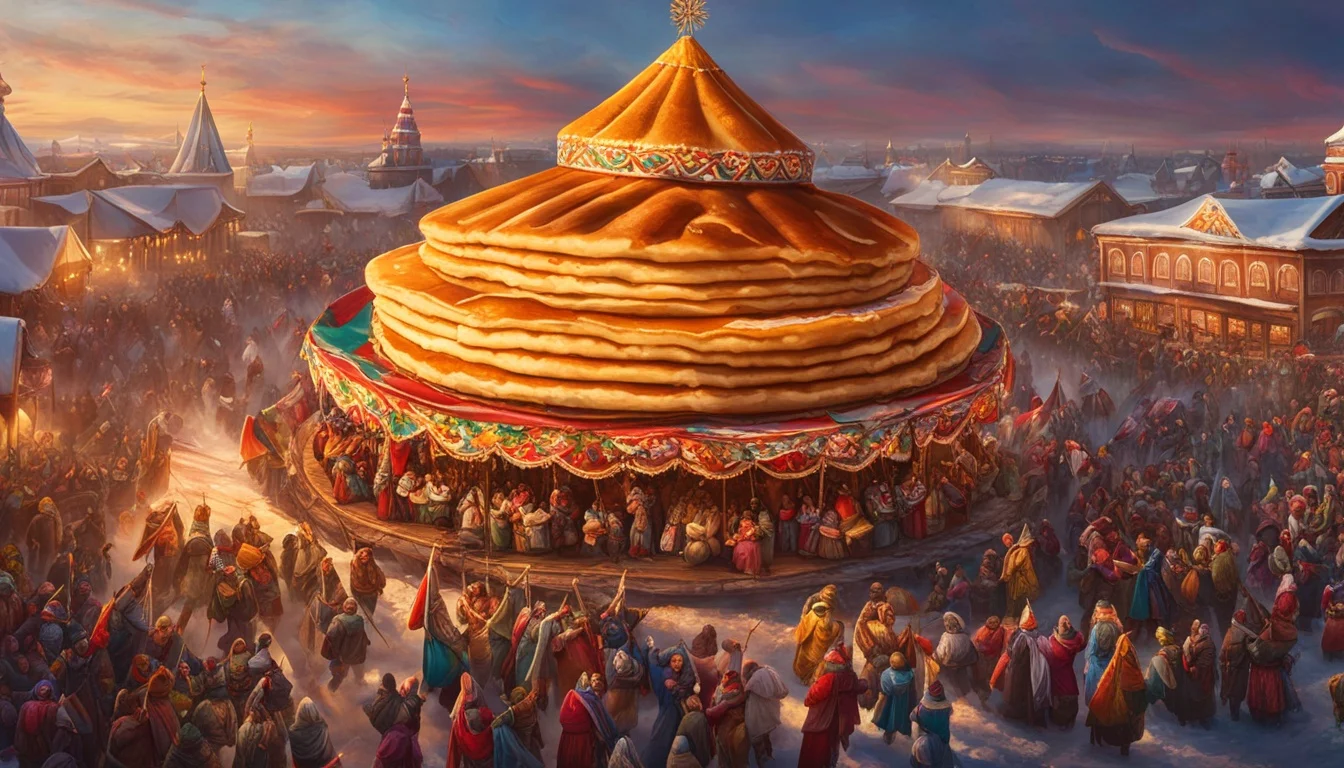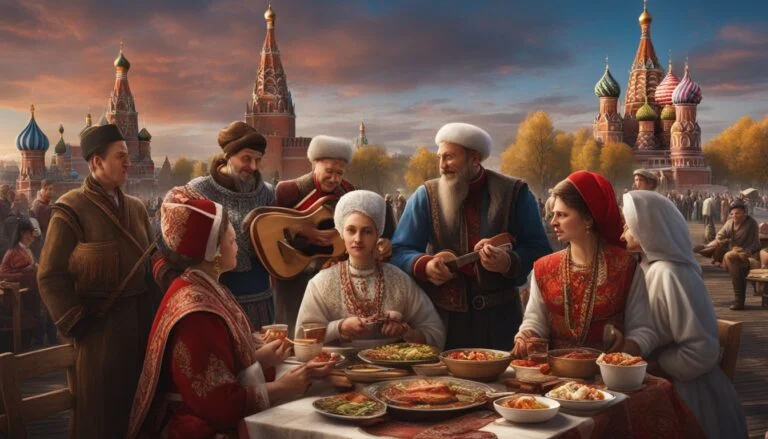5 Fascinating Russian Cultural Festivals You Need to Experience!
What if you could immerse yourself in the vibrant tapestry of Russian culture, exploring centuries-old traditions and captivating celebrations? From the grandeur of New Year’s Eve in Moscow to the mesmerizing White Nights Festival in St. Petersburg, Russia offers a treasure trove of cultural festivals that uniquely showcase the country’s rich heritage1. But these events go far beyond just fireworks and music – they provide a window into the very heart and soul of the Russian people. So, are you ready to embark on a journey through Russia’s most fascinating cultural festivals?
Key Takeaways
- Discover the diverse array of cultural festivals celebrated across Russia, from religious observances to lively music and dance performances.
- Gain a deeper understanding and appreciation for the rich traditions and local customs that shape the Russian identity.
- Explore the grand scale and spectacle of festivals like the New Year’s Eve celebrations in Moscow and the White Nights Festival in St. Petersburg.
- Immerse yourself in the vibrant energy and festive atmosphere of these unique cultural events.
- Uncover the history, symbolism, and significance behind each festival, uncovering the stories that make Russia’s cultural tapestry so captivating.
Maslenitsa Festival: Russia’s Vibrant Pancake Week
One of the most anticipated cultural festivals in Russia is Maslenitsa, also known as “Pancake Week.” This week-long celebration marks the end of winter and the arrival of spring2. Maslenitsa in Russia lasts for seven days, beginning 55 days before Easter and ends before Great Lent, starting on March 11th, 20242. The celebration was originally observed for a fortnight, starting seven days before the vernal equinox and ending seven days after the equinox.
During Maslenitsa, Russians indulge in the tradition of eating blini (Russian pancakes) with a variety of sweet and savory toppings2. Maslenitsa’s main dish is pancakes, believed to bring happiness and wealth to those who consume more during the festival. The festivities include parades, live music, dancing, and the burning of a straw effigy representing “Lady Maslenitsa” – a symbolic farewell to the cold winter months2. Maslenitsa’s history dates back to a pagan Slavic feast of farewell to winter, evolving over time to precede Great Lent after the Christianization of Russia.
3 In St. Petersburg, Maslenitsa 2.0 Festival is held in the 300 Years Park on 1st March3. Another fair in St. Petersburg is organized in Kirov Park of Art and Culture, Yelagin Island, spanning from 29th February to 1st March3. Pavlovsk Park celebrates Maslenitsa from 29th February to 1st March, allowing visitors to partake in various activities3. Maslenitsa festivities at the Peter and Paul Fortress occur in the city center on 1st March.
3 In Moscow, Revolution Square hosts a fair where representatives from over one hundred countries share Shrovetide traditions3. The Moscow Maslenitsa festival takes place in Izmailovsky Park from 21st February to 1st March, offering concerts, dance performances, and culinary masterclasses3. Tverskoy Square in Moscow features an ice rink and a pancake fair during Maslenitsa celebrations3. Maslenitsa is celebrated in St. Petersburg and Moscow from 21st February to 1st March in 2020.
4 Maslenitsa festival is celebrated during the week preceding Lent in Russia4. In the 18th century in Moscow, bear shows during Pancake Week were popular, entertaining all classes of the population4. Monday of Maslenitsa involved making a straw-stuffed figure of Winter and sledding down a snow-covered slope4. Tuesday, known as “zaigrysh” or game day, marked the beginning of various activities including sleigh riding, folk festivals, and puppet shows.
4 Wednesday was gourmand day when feasts with blini and other dishes were enjoyed in houses4. On Thursday, revelry day, games and fun activities peaked, including fistfights4. Friday traditionally involved sons-in-law being treated with pancakes in their mothers-in-law’s homes, reciprocated the next day4. Saturday was reserved for relatives to visit young wives during Maslenitsa.
4 Sunday, known as “forgiveness,” was when people asked for forgiveness for any grievances, visited cemeteries, and burned the figure of winter in a festive ceremony4. Maslenitsa ended with Clean Monday, the first day of Lent, signifying purification from sin and abstaining from forbidden foods.
Maslenitsa combines pagan and Christian elements, making it a unique celebration that showcases Russia’s rich cultural heritage. With its vibrant traditions, delicious blini, and festive atmosphere, Maslenitsa is a must-experience event for anyone interested in exploring the fascinating world of Russian culture.
Russia cultural festivals: Immersing in Authentic Local Traditions

Beyond the well-known urban celebrations, Russia is home to a variety of regional festivals that offer a glimpse into the country’s diverse cultural traditions. In the remote Yamal region, the Reindeer Herders Festival celebrates the ancient practice of nomadic reindeer herding, featuring thrilling reindeer races and traditional Nenets sports5. On Victory Day, cities across Russia come alive with military parades, fireworks, and displays of national pride, commemorating the country’s triumph over Nazi Germany5. Similarly, the observance of Russian Orthodox Easter is a deeply reverent occasion, marked by solemn church services, the exchange of decorated eggs, and the sharing of special Easter breads and pastries5. By participating in these authentic local celebrations, travelers can immerse themselves in the heart of Russian culture.
The Maslenitsa Festival, also known as Pancake Week, is a vibrant celebration that marks the end of winter and the arrival of spring6. The festival attracts a large number of domestic and international tourists annually, impacting Russian tourism significantly6. The week-long event features traditional Russian music, dance, and games, as well as the burning of the Maslenitsa effigy on the last day, a visually striking ritual symbolizing the end of winter and the rebirth of spring6. The pancakes, which are the centerpiece of the festival, represent the sun’s warmth and act as a medium of unity, bringing people together6.
Russia’s diverse cultural landscape is further enhanced by festivals such as the Ivan Kupala Festival, celebrated on or around June 22 in Russia, Latvia, Belarus, Ukraine, and other Baltic countries7. Ysyakh, one of the typical summer Russian festivals, is celebrated by the Yakuts on the summer solstice on June 217. These regional celebrations offer travelers a chance to immerse themselves in the traditions and rituals of Russia’s indigenous communities, fostering a deeper understanding of the country’s cultural heritage.
Conclusion
Russia’s cultural festivals are a testament to the country’s rich history, deep-rooted traditions, and enduring spirit8. From the grand urban celebrations in Moscow and St. Petersburg to the intimate regional events, these festivals provide visitors with a unique opportunity to experience the vibrant tapestry of Russian culture firsthand910., Whether you’re captivated by the aroma of freshly made blini, moved by the pageantry of military parades, or enchanted by the ethereal beauty of the White Nights, these festivals offer a gateway to a world of cultural discovery910.,
By planning your trip to coincide with these captivating events, you’ll create memories that will forever shape your understanding and appreciation of Russia910., From the iconic Russian Winter Festival in Moscow to the vibrant Maslenitsa celebrations across the country, each festival provides an immersive experience that showcases the country’s rich heritage and vibrant spirit910., Immerse yourself in the sights, sounds, and flavors of Russia’s cultural festivals, and you’ll uncover a deeper connection to this remarkable nation.
As you plan your journey, consider the timing of these festivals to enhance your cultural experience10. Whether you visit during the winter months to witness the captivating ice sculptures and traditional winter activities, or time your trip to coincide with the joyous Maslenitsa celebration, you’ll find that Russia’s cultural festivals offer a truly unforgettable opportunity to explore the essence of this remarkable country10.







